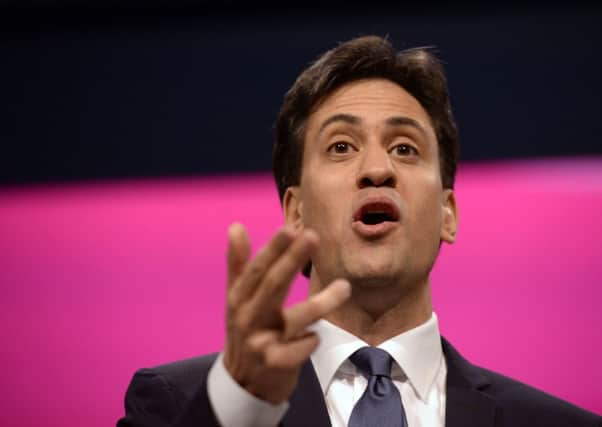Tackling deficit ‘top priority’ insists Ed Miliband


In a frank interview, Mr Miliband said that the economy is “incredibly high” on his list of priorities following criticism of his leader’s speech gaffe on Tuesday.
Political opponents were quick to attack Mr Miliband for the blunder but criticism also came from within the left.
Advertisement
Hide AdAdvertisement
Hide AdUnite union general secretary Len McCluskey said missing out the deficit had been a “glaring omission” while Chancellor George Osborne insisted it was “extraordinary”.
In previous years, Mr Miliband’s gamble of giving a speech to conference without notes has paid off but as he toured the television and radio studios this morning to talk about the vision he had set out, the Labour leader faced an onslaught of questions about what he had failed to say.
Asked in a broadcast interview if he had forgotten parts of his speech, he said: “Absolutely, yes.
“It’s not really about memorising the speech. What I try and do is I try and write a speech and then I use it as the basis for what I want to say to the country.
“In a way, I could just stand there and read out a speech that’s been prepared earlier. I like it as a way of engaging with people. And, of course, it’s one of the perils of it that there are bits that get left out, bits that get added in. It sort of comes with the territory.”
He added: “The speech was all about the economy. The speech was all about how we change our economy so it works for working people again.”
A version of the speech emerged that showed Mr Miliband had planned to talk about the deficit and tell activists at Manchester Central that “there won’t be money to spend after the next election”.
He also intended to discuss immigration, setting out how people who come to Britain “have a responsibility to learn English and earn their way”.
Advertisement
Hide AdAdvertisement
Hide AdMr Miliband insisted today that he had talked “very clearly” about Labour’s immigration plans.
“I didn’t pluck a number out of the air for what should happen to immigration, but, you know, the Prime Minister has done that,” he said. “He made a promise, he made a false promise to get immigration into the tens of thousands and it didn’t happen.”
Asked if he had forgotten the section relating to the economy, he told BBC Breakfast: “Yes, I didn’t do one part of the speech and I added in other bits.”
Pressed on whether he would expect a future prime minister to remember the deficit, he replied: “Yes, and I did and I talked about how we wouldn’t borrow more for the NHS.”
Although Mr Miliband’s failure to address the economy during the 65-minute speech has generated negative headlines, the Labour leader insisted he would “absolutely” continue to go note-free when he takes to the stage in future.
He insisted that the economy was “incredibly high” on his list of priorities and said shadow chancellor Ed Balls had set out a “clear plan” for getting the deficit down earlier in the week.
Asked if he would mention the deficit if he gave the speech again, he replied: “I’m sure that I would do it differently. If I did the speech again today, I would do it differently. I added bits in that weren’t actually in the original text. In a way, that’s the way I tend to do these speeches.”
One of the main pitches in the speech was using the proceeds of the charge on £2 million-plus properties - along with a levy on tobacco firms and a crackdown on tax dodgers - to fund £2.5 billion extra NHS funding.
Advertisement
Hide AdAdvertisement
Hide AdBut the party is yet to publish full details of how the charge would operate, sparking fears it could leave many more people facing higher council tax bills.
Mr Miliband said a system was already in place that allowed the Government to impose a similar levy on expensive properties bought through companies.
“You get assessors to do it. I can absolutely assure you it’s not about a general revaluation,” he said.
SEE ALSO